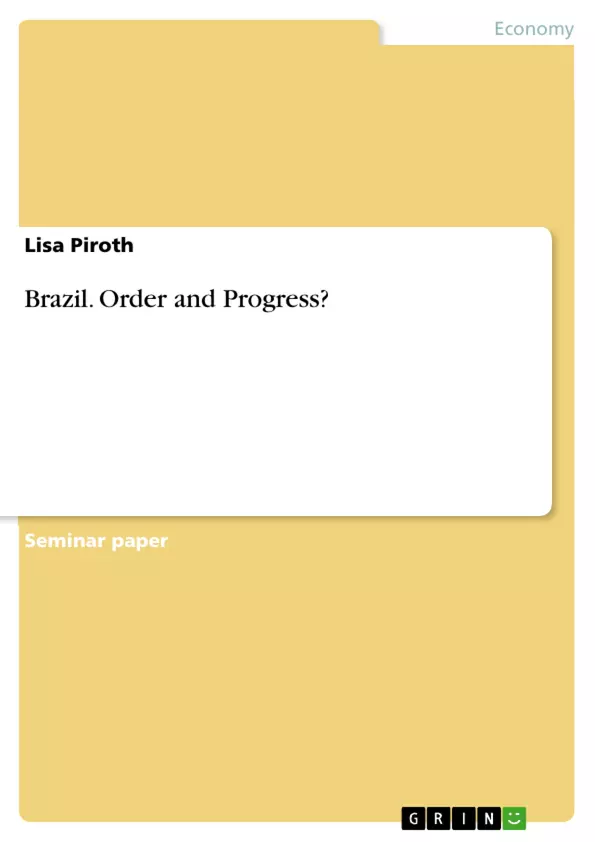This paper provides an overview about Brazil, its economy and recent developments. The following chapter gives an introduction into general information and backgrounds that will serve as foundation for the following chapters. Chapter 3 provides insight into economic policies and show how far politics are intertwined with the economy. This is followed by a short macroeconomic overview and the development of the GDP and inflation over the last years after which the most important economic sectors will be introduced. An insight into international economic relations of Brazil regarding major trade partners as well as commodities will be given in chapter 6. All of this will finally be completed by a conclusion and outlook on potential developments and possible changes in the future.
Brazil has lately been very present in the media and demanded worldwide attention due to hosting main sport events like the FIFA World Cup in 2014 and Olympic Games in 2016. Along with that the media focused not only on the events themselves but also the host country and its condition. It is a common phenomenon that also events that are not related to the sport events gain more attention and are internationally observed closer. That was when I noticed that I hadn’t known much about Brazil, its politics or economy. By following news and also writing this paper I found out that there, of course, is much more about Brazil than Carnival in Rio and a national soccer team Germany beat 7:1.
While working on the paper a relevant political event happened: after the President Dilma Rousseff was impeached earlier this year she was officially replaced by her Vice President Michel Temer on 31 August 2016. This I took as a frame for my country paper and focused on recent events and changes that might come with this change of power.
Inhaltsverzeichnis (Table of Contents)
- Introduction
- Motivation
- Structure of Paper
- Country Background
- General Information and current events
- Social Issues: Poverty and Education
- Economic Policy
- Development policy approach
- Participation of government in economy
- Fiscal Policy
- Monetary Policy
- Current Macroeconomic Situation
- GDP growth
- Inflation
- Unemployment
- Economic Structure
- Agricultural sector
- Industry sector
- Service sector
- Areas/Branches of high importance/competitiveness
- International Economic Relations
- Foreign trade broken down by major regions/countries
- Foreign trade broken down by commodities
- Foreign direct investments
- Labor exports
- Participation in customs unions/free trade areas
- Foreign exchange policy
- Major Problems and Potentials of Economy
- Opportunities
- Threats
Zielsetzung und Themenschwerpunkte (Objectives and Key Themes)
This paper aims to provide a comprehensive analysis of the Brazilian economy, examining its historical development, current economic situation, and future prospects. The paper focuses on understanding the factors that have shaped Brazil's economic growth and the challenges it faces in achieving sustainable and inclusive development.
- The role of government in Brazil's economic development
- The impact of social issues such as poverty and education on economic performance
- The macroeconomic environment and its influence on economic growth
- The importance of international economic relations for Brazil's development
- Challenges and opportunities facing the Brazilian economy
Zusammenfassung der Kapitel (Chapter Summaries)
The paper begins by introducing the reader to the motivation behind the study and outlining the structure of the paper. Chapter 2 provides a detailed overview of the country's background, including general information and current events, as well as a discussion of social issues such as poverty and education. Chapter 3 delves into the economic policy of Brazil, examining the country's development policy approach, government participation in the economy, fiscal policy, and monetary policy.
Chapter 4 examines the current macroeconomic situation in Brazil, focusing on GDP growth, inflation, and unemployment. Chapter 5 provides an in-depth analysis of the economic structure of Brazil, covering the agricultural, industrial, and service sectors, as well as areas and branches of high importance and competitiveness. Finally, Chapter 6 explores Brazil's international economic relations, examining foreign trade, foreign direct investments, labor exports, participation in customs unions and free trade areas, and foreign exchange policy.
Schlüsselwörter (Keywords)
The paper focuses on the Brazilian economy, economic policy, social issues, macroeconomic situation, economic structure, international economic relations, development policy, government participation, fiscal policy, monetary policy, GDP growth, inflation, unemployment, agricultural sector, industrial sector, service sector, foreign trade, foreign direct investment, labor exports, customs unions, free trade areas, and foreign exchange policy.
Frequently Asked Questions
What is the current economic situation in Brazil (as of 2016)?
The paper analyzes Brazil's macroeconomic state, focusing on GDP growth, high inflation, and unemployment rates during a period of political transition.
How did the impeachment of Dilma Rousseff affect the country?
The paper uses the official replacement of Rousseff by Michel Temer on August 31, 2016, as a frame to discuss potential changes in economic and fiscal policy.
What are the most important economic sectors in Brazil?
Brazil's structure is divided into the agricultural sector, the industry sector, and the service sector, with specific focus on competitive commodities.
What role did major sporting events play in Brazil's economy?
Hosting the 2014 FIFA World Cup and the 2016 Olympic Games brought worldwide attention to Brazil's infrastructure and social issues like poverty and education.
What are the major threats to Brazil's economic development?
Key challenges include social inequality, fiscal instability, and the need for reform in monetary policy to combat inflation.
- Citar trabajo
- Lisa Piroth (Autor), 2016, Brazil. Order and Progress?, Múnich, GRIN Verlag, https://www.grin.com/document/471283



